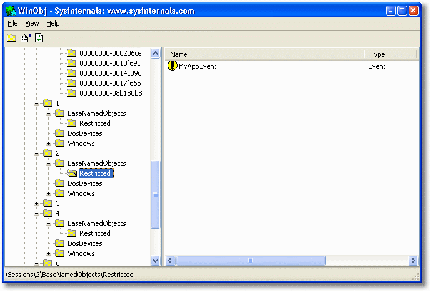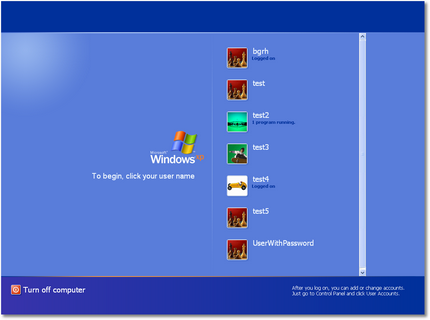Remko Weijnen's Blog (Remko's Blog)
About Virtualization, VDI, SBC, Application Compatibility and anything else I feel like
Archive for the ‘Delphi’ Category
Sending WM_KEYDOWN or WM_KEYUP
Author: Remko Weijnen30 Mar
If you read the MSDN documentation of WM_KEYDOWN and WM_KEYUP you can see that those message require us to interpret lParam as a bitfield:
lParam
Specifies the repeat count, scan code, extended-key flag, context code, previous key-state flag, and transition-state flag, as shown in the following table.0-15
Specifies the repeat count for the current message. The value is the number of times the keystroke is autorepeated as a result of the user holding down the key. The repeat count is always one for a WM_KEYUP message.
16-23
Specifies the scan code. The value depends on the OEM.
24
Specifies whether the key is an extended key, such as the right-hand ALT and CTRL keys that appear on an enhanced 101- or 102-key keyboard. The value is 1 if it is an extended key; otherwise, it is 0.
25-28
Reserved; do not use.
29
Specifies the context code. The value is always 0 for a WM_KEYUP message.
30
Specifies the previous key state. The value is always 1 for a WM_KEYUP message.
31
Specifies the transition state. The value is always 1 for a WM_KEYUP message.
I was looking for a convenient way to get and read the bits and this is what I made up:
(more…)
Reading physical memory size from the registry
Author: Remko Weijnen20 Mar
I’m working on a new build of TSAdminEx for which I need to query the total amount of physical memory. Locally we can use the GlobalMemoryStatusEx API but there’s no API to do this remotely. It would be possible using WMI but I decided not to use that because I dislike it because of it’s slowness and I need support for older OS versions which might not have WMI.
So I found in the registry the following key:
HKLM\HARDWARE\RESOURCEMAP\System Resources\Physical Memory
It has a value .Translated of type RES_RESOURCE_LIST which seems undocumented besides stating that it exists. Regedit knows how to handle it though. If you doubleclick on the key you will see something like this:
Accessing kernel objects in other sessions part 2
Author: daNIL3 Feb
In part 1 I showed how to create and open objects in Terminal Server Sessions. However, these are not all of the possible places where you can place objects via documented kernel32.dll functions.
If we look into Winobj again, we notice, that every BaseNamedObjects directory has a subdirectory named Restricted. To be honest, I do not know why it’s created; it’s security allows object creation for LocalSystem and RESTRICTED special user (in windows 2000, Everyone can also create objects in it). So, we can use it as prefix for object creation, for example, Restricted\MyAppEvent: 
Of course, you can still use Global, Local, or Session links (more…)
Accessing kernel objects in other sessions part 1
Author: daNIL27 Jan
As you know, many kernel32.dll functions, which are working with named objects, like OpenEvent, can be used to work with global and local objects. So what are global and local objects? Global objects are created in session 0 and are actually located in the \BaseNamedObjects directory, while local objects are created in the caller’s session (for example in the \Sessions\5\BaseNamedObjects directory (for session 0, global and local has no meaning since they point to the same object)). MSDN says that you can access only the objects in your own session(via the Local\ prefix) and in session 0 (via the Global\ prefix). But what if you need to access an object in another session? (more…)
Locking a workstation – part 2
Author: daNIL23 Dec
In part 1 I showed how winlogon.exe registers its process and main window handle.
In the SasCreate function, winlogon.exe registers hotkeys like this:
1 2 3 4 5 6 7 8 9 10 11 12 13 14 15 16 17 18 | const MOD_SAS = $8000; RegisterHotKey(SasWindow, 0, MOD_SAS or MOD_CONTROL or MOD_ALT, VK_DELETE); {$IFDEF CHECKED_BUILD} RegisterHotKey(SasWindow, 1, MOD_ALT or MOD_CONTROL or MOD_SHIFT, VK_DELETE); // handler just calls NtShutdownSystem if EnableDesktopSwitching then RegisterHotKey(SasWindow, 2, MOD_ALT or MOD_CONTROL, VK_TAB); // handler switches default and winlogon desktops if WinlogonInfoLevelFlag then RegisterHotkey(SasWindow, 3, MOD_ALT or MOD_CONTROL or MOD_SHIFT, VK_TAB); // handler just calls DebugBreak {$ENDIF} RegisterHotKey(SasWindow, 4, MOD_CONTROL or MOD_SHIFT, VK_ESCAPE); // handler executes task manager {$IFDEF WINXP_OR_LATER} RegisterHotKey(SasWindow, 5, MOD_WIN, Byte('L'); // handler locks the workstation RegisterHotkey(SasWindow, 6, MOD_WIN, Byte('U'); // handler executes utilman on current desktop {$ENDIF} |
Did you notice the MOD_SAS constant? (more…)
Locking a workstation – part 1
Author: daNIL13 Dec
Win32 API provides only 1 function for locking workstation, named LockWorkstation. What does it do and how we can use it?
When a new session is started, smss.exe invokes winlogon.exe. It registers its process id in win32k.sys by calling RegisterLogonProcess. It has this prototype: (more…)
Converting a volume name to a device name
Author: Remko Weijnen10 Dec
Windows has a couple of different formats for volume names but it is unclear how to convert a Volumename (example: \\?\Volume{GUID}\) to a DeviceName (example: \Device\HarddiskVolume1).
I found at that you can use the QueryDosDevice function but you need to remove the preceeding \\?\ and the trailing \ of the VolumeName:
1 2 3 4 5 6 7 8 9 10 11 12 13 14 15 16 17 18 19 20 21 | function VolumeNameToDeviceName(const VolName: String): String; var s: String; TargetPath: Array[0..MAX_PATH] of WideChar; bSucceeded: Boolean; begin Result := ''; // VolumeName has a format like this: \\?\Volume{c4ee0265-bada-11dd-9cd5-806e6f6e6963}\ // We need to strip this to Volume{c4ee0265-bada-11dd-9cd5-806e6f6e6963} s := Copy(VolName, 5, Length(VolName) - 5); bSucceeded := QueryDosDeviceW(PWideChar(WideString(s)), TargetPath, MAX_PATH) <> 0; if bSucceeded then begin Result := TargetPath; end else begin // raise exception end; end; |
Executing a Fast User Switch programmatically – part 2
Author: daNIL26 Nov
Let’s write our own Credential Server implementation.
At first, we need to create a named pipe with a unique name. Let’s construct the pipe name using a GUID – this should be unique, but we can do it in a cycle to be absolutely sure: (more…)
Executing a Fast User Switch programmatically – part 1
Author: daNIL26 Nov
I think many of you have got experience with multiple Terminal Server Sessions in windows XP, also called Fast User Switching (FUS). Let’s get inside this cool feature.
How does FUS work? Each session has its own winlogon.exe. It draws the same interface which looks like the screenshot below:
Terminal Server Internals
Author: daNIL19 Nov
Hello, my name is Danila Galimov and i will write here sometimes 🙂
My first post is about communications between Terminal Server sessions and Terminal Server service process (termsrv.exe/dll). Terminal Server service needs to communicate with each session for many tasks, such as sending window message, getting message reply and so on. So, on init, Terminal Server creates a SmSsWinStationApiPort port in global namespace and runs a few WinStationLpcThread threads, which are listening on port and are used to process port messages. When csrss.exe is started, it parses its command line, which usually looks like:
%SystemRoot%\system32\csrss.exe ObjectDirectory=\Windows SharedSection=4096,4096,1024 Windows=On SubSystemType=Windows ServerDll=basesrv,1 ServerDll=winsrv:UserServerDllInitialization,3 ServerDll=winsrv:ConServerDllInitialization,2 ProfileControl=Off MaxRequestThreads=16
and loads the required dlls (winsrv.dll in our case). Initialization of winsrv.dll creates a thread, which connects to SmSsWinStationApiPort port and does the loop for processing Terminal Server messages until it receives WinStationTerminate message.
We’ll try to fool Terminal Server (more…)
Profile
Top Posts
- Query Active Directory from Excel
- RNS 510 Startup Logo–My thoughts
- Adding a hidden Exchange mailbox to Outlook
- How rdp passwords are encrypted
- Get Actual CPU Clock Speed with PowerShell
- ClickOnce Applications in Enterprise Environments
- VW RNS 510 Navigation Startup Pictures
- Unattended Installation of IBM System i Access for Windows
- Reading physical memory size from the registry
- Show Client IP Address when using NetScaler as a Reverse Proxy
Recent Comments
Featured Downloads
- AClientFix (13595 downloads )
- AddPrinter2.zip (12854 downloads )
- AdProps (12379 downloads )
- AdSample1 (11432 downloads )
- AMD Radeon Crimson ReLive (29651 downloads )
- Atheros Driver (34019 downloads )
- AutoLogonXP 1.0 (11404 downloads )
- CDZA (9560 downloads )
- ChDrvLetter.zip (11217 downloads )
- ChDrvLetter.zip (14356 downloads )
Blogroll
- Andrew Morgan
- Arnout’s blog
- Assa’s Blog
- Barry Schiffer
- Delphi Praxis
- Ingmar Verheij
- Jedi Api Blog
- Jedi API Library
- Jeroen Tielen
- Kees Baggerman
Categories
- .NET (4)
- Active Directory (28)
- Altiris (36)
- App-V (1)
- Apple (5)
- Application Compatibility (11)
- Automotive (5)
- AWS (1)
- BootCamp (1)
- C# (6)
- C++ (2)
- Citrix (87)
- Delphi (61)
- Embedded (4)
- Exchange (16)
- General (71)
- iPhone (5)
- Java (8)
- Linux (1)
- Lync (2)
- NetScaler (1)
- Oracle (4)
- Other (1)
- Packaging (19)
- PowerShell (56)
- Programming (79)
- Quest (1)
- RES (7)
- script (22)
- ShareFile (1)
- SQL Server (10)
- Strange Error (3)
- Terminal Server (68)
- ThinApp (3)
- ThinKiosk (1)
- Ubuntu (1)
- Unattended Installation (19)
- Uncategorized (51)
- UWP (2)
- Vista (37)
- Visual Studio (1)
- VMWare (26)
- Windows 10 (2)
- Windows 2003 (30)
- Windows 2008 (37)
- Windows 2008 R2 (16)
- Windows 2012 (2)
- Windows 7 (30)
- Windows 8 (4)
- Windows Internals (12)
- Windows XP (16)
Archives
- February 2023 (1)
- October 2022 (3)
- July 2022 (1)
- June 2022 (2)
- October 2019 (1)
- March 2018 (1)
- January 2018 (4)
- December 2017 (3)
- April 2017 (1)
- March 2017 (5)
- February 2017 (4)
- May 2016 (3)
- March 2016 (1)
- October 2015 (2)
- September 2015 (1)
- January 2015 (1)
- August 2014 (1)
- July 2014 (8)
- May 2014 (1)
- November 2013 (1)
- October 2013 (2)
- September 2013 (3)
- August 2013 (4)
- June 2013 (2)
- May 2013 (3)
- April 2013 (5)
- March 2013 (5)
- February 2013 (1)
- January 2013 (5)
- December 2012 (9)
- November 2012 (3)
- October 2012 (3)
- August 2012 (4)
- July 2012 (2)
- June 2012 (1)
- May 2012 (6)
- March 2012 (13)
- February 2012 (12)
- January 2012 (9)
- December 2011 (9)
- November 2011 (4)
- October 2011 (5)
- September 2011 (10)
- August 2011 (10)
- July 2011 (2)
- June 2011 (8)
- May 2011 (12)
- April 2011 (4)
- March 2011 (14)
- February 2011 (8)
- January 2011 (32)
- December 2010 (23)
- November 2010 (19)
- October 2010 (10)
- September 2010 (6)
- August 2010 (1)
- July 2010 (1)
- June 2010 (6)
- March 2010 (7)
- February 2010 (3)
- December 2009 (3)
- November 2009 (11)
- September 2009 (2)
- July 2009 (1)
- June 2009 (5)
- May 2009 (1)
- April 2009 (2)
- March 2009 (3)
- February 2009 (6)
- January 2009 (3)
- December 2008 (8)
- November 2008 (5)
- October 2008 (3)
- September 2008 (3)
- August 2008 (3)
- June 2008 (6)
- May 2008 (2)
- April 2008 (3)
- March 2008 (5)
- January 2008 (3)
- December 2007 (3)
- November 2007 (13)
- October 2007 (10)

